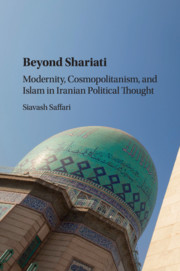
-
Select format
-
- Publisher:
- Cambridge University Press
- Publication date:
- 09 March 2017
- 16 February 2017
- ISBN:
- 9781316686966
- 9781107164161
- 9781316615751
- Dimensions:
- (228 x 152 mm)
- Weight & Pages:
- 0.48kg, 220 Pages
- Dimensions:
- (229 x 152 mm)
- Weight & Pages:
- 0.4kg, 220 Pages
You may already have access via personal or institutional login
Book description
Ali Shariati (1933–77) has been called by many the 'ideologue of the Iranian Revolution'. An inspiration to many of the revolutionary generation, Shariati's combination of Islamic political thought and Left-leaning ideology continues to influence both in Iran and across the wider Muslim world. In this book, Siavash Saffari examines Shariati's long-standing legacy, and how new readings of his works by contemporary 'neo-Shariatis' have contributed to a deconstruction of the false binaries of Islam/modernity, Islam/West, and East/West. Saffari argues that through their critique of Eurocentric metanarratives on the one hand, and the essentialist conceptions of Islam on the other, Shariati and neo-Shariatis have carved out a new space in Islamic thought beyond the traps of Orientalism and Occidentalism. This unique perspective will hold great appeal to researchers of the politics and intellectual thought of post-revolutionary Iran and the greater Middle East.
Awards
Co-winner, 2018 First Book Award, Foundations of Political Theory, American Political Science Association
Reviews
‘Beyond Shariati signals the opening horizons of a fertile critical thinking to come.'
Hamid Dabashi - Columbia University, New York
‘By focusing on the Iranian thinker, Dr Ali Shariati and his influence on modernist thinkers in Iran and beyond in the Muslim world, Siavash Saffari has challenged prevailing theses that privilege Eurocentric analysis of the history of modernization in the global context … No student of modern Islam or Iran can afford to ignore this valuable contribution.'
Abdulaziz Sachedina - George Mason University, Virginia
‘In recent times, the relation between Western modernity and Islam has been a prominent topic of social-theoretical discussions … By focusing attention on the Iranian intellectual Ali Shariati and his later followers (the ‘neo-Shariatis'), Saffari shows that customary binaries - such as ‘Western universalism' vs ‘Islamic parochialism' - are hasty abstractions and also neglect a crucial geopolitical binary: that between center and periphery, between colonizers and colonized.'
Fred Dallmayr - University of Notre Dame, Indiana
Contents
Metrics
Altmetric attention score
Full text views
Full text views help Loading metrics...
Loading metrics...
* Views captured on Cambridge Core between #date#. This data will be updated every 24 hours.
Usage data cannot currently be displayed.
Accessibility standard: Unknown
Why this information is here
This section outlines the accessibility features of this content - including support for screen readers, full keyboard navigation and high-contrast display options. This may not be relevant for you.
Accessibility Information
Accessibility compliance for the PDF of this book is currently unknown and may be updated in the future.


